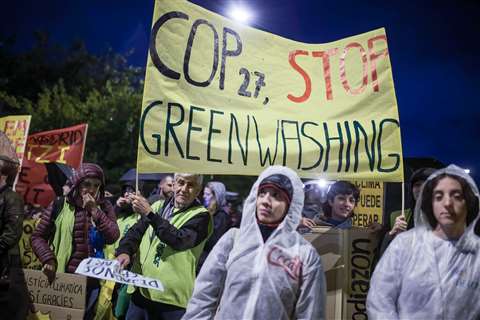How construction can avoid allegations of ‘greenwashing’
28 February 2023
Companies in the construction sector must do more to avoid allegations of ‘greenwashing’ or face financial penalties, a leading classification society has warned.
Bureau Veritas, a company which specialises in testing, inspection and certification in the building and infrastructure sector, warned company bosses that a new spate of laws in Europe and the UK aimed at outlawing corporate greenwashing are set to make it easier for government watchdogs to crack down on companies publishing misleading information which may persuade the public that an organisation’s products, services, aims and policies are more environmentally friendly than they are.
What is greenwashing?
The organisation has published a guide to understanding green claims.
The French Climate and Resilience law came into effect in January 2023 which requires firms to provide annual details of the carbon pollution associated with a products entire life cycle if it is advertised as having net zero emissions.
 Protestors in Madrid demand an end to greenwashing at an event to coincide with the 27th UN Conference on Climate Change (Cop27). Photo: Reuters/Luis Soto
Protestors in Madrid demand an end to greenwashing at an event to coincide with the 27th UN Conference on Climate Change (Cop27). Photo: Reuters/Luis Soto
The European Union’s proposed amendments to the Unfair Commercial Practices Directive also aims to clamp down on companies promoting their products as “climate neutral” or “containing recycled materials” if such labels are not substantiated. EU countries would have to ensure environmental claims are proven against a science-based methodology such as a “product environmental footprint” framework that tracks environmental impacts across 16 categories.
And, in the UK, a new Digital Markets Competition and Consumer Bill, first announced in April 2022, imposes fines of up to 10% of a company’s global turnover and of up to £300,000 ($358,000) for individuals for companies which intentionally mislead consumers over their green initiatives.
“Green claims don’t have to be intentionally misleading to be labelled as greenwashing and in today’s fast moving business communications environment, the risk of conveying uncontrolled or unintentional misinformation, is high,” said Christopher Jockel, principal sustainability consultant at Bureau Veritas.
“Intense scrutiny and action against greenwashing is escalating worldwide, putting organisations and their leaders on notice regarding overstatements or misleading claims and incurring potential reputation and regulatory risk.”
In December, an International Construction survey of the sustainability reports produced by a selection of 50 of the world’s biggest contractors, construction equipment OEMs and rental companies found that nearly all of them had made some sort of commitment to reducing emissions and improving their impact on the environment but that less than half of those surveyed had had their targets verified by the independently verified Science Based Targets initiative.
Governments around the world are under increasing pressure to tighten the rules preventing corporate greenwashing as scrutiny increases from consumers and investors.
COP27 and greenwashing
At last year’s COP27 Climate Change conference in Sharm el-Sheikh, UN Secretary General António Guterres published a report criticising both greenwashing a weak net-zero pledges.
In 2020, a European Commission survey of 150 products’ environmental characteristics found that 53% gave only “vague, misleading and unfounded information.”
The UK Competition and Markets Authority - the competition regulator in United Kingdom - coordinated a global review of randomly selected websites and discovered that 40% of green claims made online could be misleading consumers.
Jockel announced that Bureau Veritas has launched a webinar and downloadable guide to understanding green claims in order to help firms “navigate the myriad of intricacies surrounding greenwashing.”
“The benefits for businesses who successfully manage their Green Claims, are considerable,” he said. “Not only will they reduce the risk of reputational and financial impacts, but companies can gain a competitive edge and in turn, increase customer retention, while building confidence in the information provided to customers, stakeholders and investors.”
DO make greens claims that:
-Are legally and specifically attributable to your organisation and/or your activities/products
-Are measurable as far as possible and accurately measured
-Have some permanency, i.e. they are fully integrated into your business and likely to endure
-Are unique, i.e. they are not repackaged duplicates of another claim presented previously or differently
-Are independently verified or verifiable
-Are reliable
-Are clear
-Are balanced, which means both positive and negative performance should be reported
-Are comparable (for example year on year and against peers), timely (they are current or recent) and supported by easily accessible information or by a reliable third-party
-Visualise data where appropriate, following good practice to display information most effectively
To avoid greenwashing, DON’T make green claims that:
-You know to be false
-Are based on an unreasonably narrow set of sustainability attributes without attention to other important issues that actually may be adversely affected
-Make unsubstantiated claims Are poorly defined or so broad that its real meaning is likely to be misunderstood
-Give the impression of a third-party endorsement where none exists
-May be truthful but which are irrelevant or unhelpful to consumers seeking environmentally-preferable products
-May be true within the product category, but that risks distracting consumers from the greater environmental impact of the category as a whole
-Use suggestive pictures that imply or evoke a baseless green impact
-Use jargon or information that the average person cannot readily understand or would be able to verify
Source: Bureau Veritas
STAY CONNECTED


Receive the information you need when you need it through our world-leading magazines, newsletters and daily briefings.
CONNECT WITH THE TEAM











